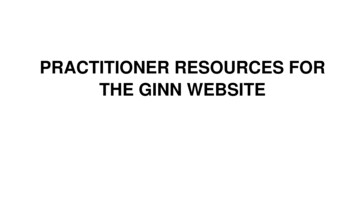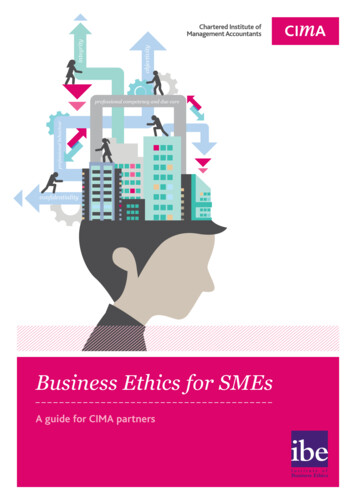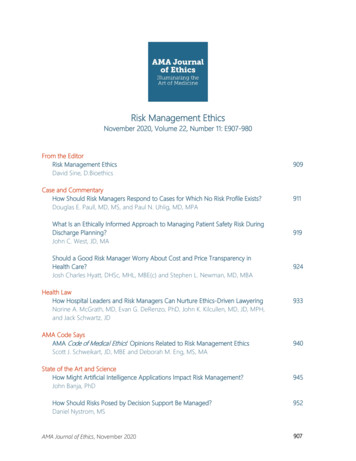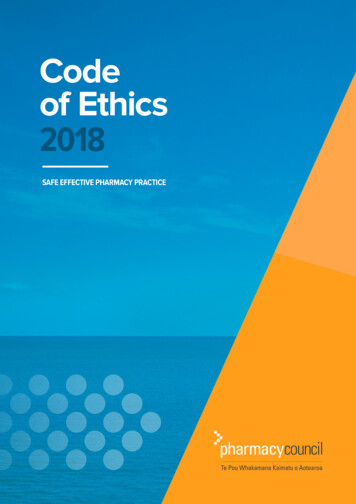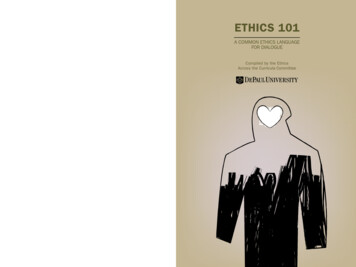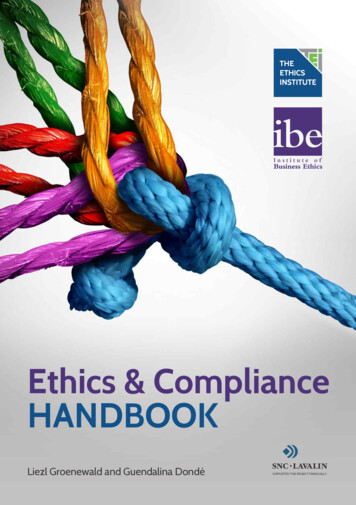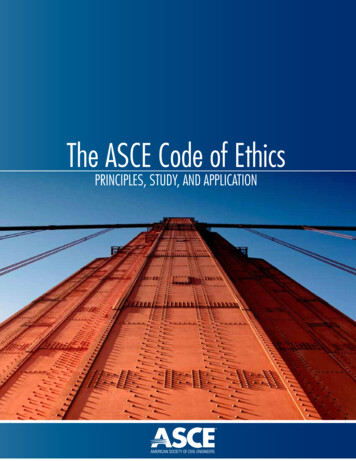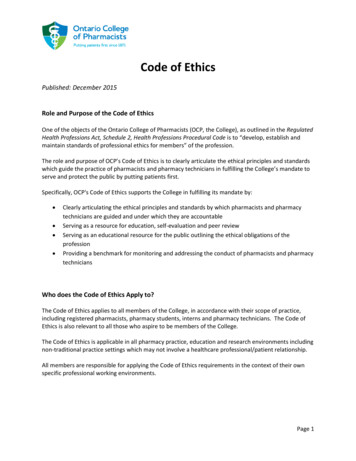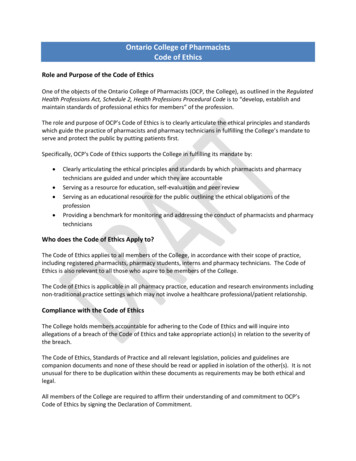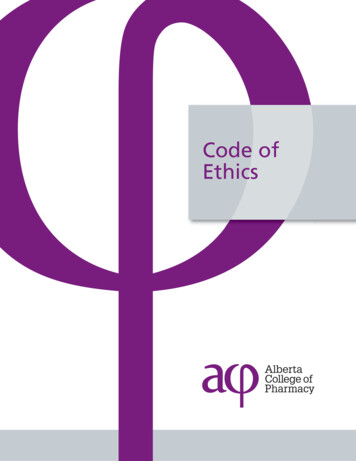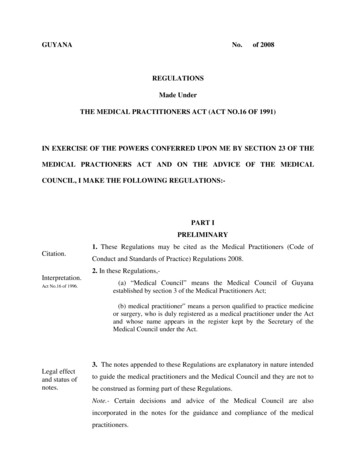
Transcription
GUYANANo.of 2008REGULATIONSMade UnderTHE MEDICAL PRACTITIONERS ACT (ACT NO.16 OF 1991)IN EXERCISE OF THE POWERS CONFERRED UPON ME BY SECTION 23 OF THEMEDICAL PRACTIONERS ACT AND ON THE ADVICE OF THE MEDICALCOUNCIL, I MAKE THE FOLLOWING REGULATIONS:-PART IPRELIMINARY1. These Regulations may be cited as the Medical Practitioners (Code ofCitation.Conduct and Standards of Practice) Regulations 2008.2. In these Regulations,-Interpretation.Act No.16 of 1996.(a) “Medical Council” means the Medical Council of Guyanaestablished by section 3 of the Medical Practitioners Act;(b) medical practitioner” means a person qualified to practice medicineor surgery, who is duly registered as a medical practitioner under the Actand whose name appears in the register kept by the Secretary of theMedical Council under the Act.3. The notes appended to these Regulations are explanatory in nature intendedLegal effectand status ofnotes.to guide the medical practitioners and the Medical Council and they are not tobe construed as forming part of these Regulations.Note.- Certain decisions and advice of the Medical Council are alsoincorporated in the notes for the guidance and compliance of the medicalpractitioners.
2HippocraticOath.4. (1) The Hippocratic Oath of the medical practitioners is given inAnnexure I.(2) A medical practitioner is required to have adequate knowledge ofthe following :(a) rapid advances in medicine and medical technology;(b) high cost of providing good basic health care;(c) medical certificates;(d) health information availability;(e) law and litigation aspects;(f) pro-choice legislation;(g) consent to medical treatment;(h) medical research issues;(i) wide range of treatment choices and alternatives;(j) importance of modern technology, including the use of hightechnology in the diagnostic process and assisted fertility andcloning;(k) end of life issues and assisted death;(l) definition of death;(m) tissue transplantation related issues;(n) role of religion and human rights; and(o) patients’ charter of rights.Note1. - Professional ethics are those principles that regulate the conductbetween professionals and others with whom the professionals come incontact with in the course of their work. In the case of medical practitionersthis usually refers to patients, colleagues and other health professionals,Government departments, statutory bodies, courts, employers and third partypayers. Observance of these principles has always been considered importantas sick or disabled persons and their relatives may be vulnerable to
3exploitation in their efforts to obtain a cure or relief from pain or suffering.Note 2.- (i) The Hippocratic Oath represented an early attempt to codify theprinciples mentioned in Note 1. Although the language is archaic and theconcepts somewhat different from current verbal expressions, the HippocraticOath does contain the basic tenets of good practice and sound ethics whichstill guide modern medical practitioners. These are(a) building on professional interrelationships;(b) documenting in good faith;(c) reproductive health;(d) avoiding unnecessary or unsafe treatment; and(e) avoiding improper relationships with patients or theirdependents.(ii) Throughout the ages, the medical practitioners haveconsidered it their duty to uphold these principles. The MedicalCouncil has the statutory responsibility to uphold standards ofprofessional conduct and competence, either by suspending orwithdrawing the license of erring medical practitioners or byimposing any other penalty admissible under the Act. At theinternational level several bodies have attempted to codify whatmany medical practitioners generally regard it as an obligation torespect their patients' basic human rights. These are referred to asInternational Human Rights Instruments by the United NationsCommission for Human Rights and have been taken intoconsideration while making these Regulations. More importantly,in the course of their daily practice, the medical practitioners areoften the first to become aware of abuse to human rights andtherefore they should carry an even higher consciousness of whatthese rights represent.Internationalhuman rightsinstruments.5. Every medical practitioner shall get himself aware of the various abuses tohuman rights and become acquainted with the international human rightsinstruments listed in Annexure II.
4PART IIJOINT CODE OF ETHICSJoint Code ofEthics.Annexure III6. Every medical practitioner shall comply with the provisions of the JointCode of Ethics given in Annexure III.PART IIIRESPONSIBILITIES TO PATIENTSNote 1.-All patients are entitled to good standards of practice and care fromtheir medical practitioners.Note 2.-Essential elements of good standard of practice are professionalcompetence, good relationships with patients and colleagues and observanceof professional ethical considerations.Standards ofcare required.7. (1) Every medical practitioner shall practice the art and science of medicineto the best of his ability and shall knowingly never expose patients toavoidable risks.(2) Every medical practitioner shall have due regard to the duties generallyAnnexure IV.specified in Annexure IV.(3) A good standard of care to be offered by a medical practitioner includes(i)adequate assessment of the patient's conditions based on thehistory and symptoms and, if necessary, an appropriateexamination;(ii)providing or arranging investigations and treatment as arenecessary;(iii)taking suitable and prompt action, as and when necessary.(4) A medical practitioner shall(a)recommend only diagnostic procedures and therapyconsidered essential to assist in the care of a patient and shallrecognize the responsibility to advise the patient of the findings andmake recommendations which will help the patient to reach a mutually
5agreeable decision that he is comfortable with;(b) have the responsibility to acquireup-to-date knowledge ofrelevant developments in the field of his practice and the patientsshould not be subjected to risks from unnecessary or outdatedprocedures;(c) recognize when his own professional knowledge, skill,competence and experience are inadequate and shall be willing torefer patients to suitably qualified and experienced colleagues as maybe available;(d) practice medicine in a manner which is above reproach andshall take neither physical nor emotional or financial advantage ofthe patient;(e) listen to his patients, respect their views, and treat them withdignity and respect in a polite and considerate manner;(f)recognize the patients' right to choose their medicalpractitioners freely, accept or refuse treatment after receiving adequateinformation and seek a second opinion, if they so desire;(g) take steps to ensure the availability of medical care to hispatients, and may only withdraw from the responsibility of continued care forhis patients after adequate arrangements have been made for such continuityof care by another suitably qualified medical practitioner;(h) recognize his responsibility to render medical service to anyperson regardless of race, colour, religious, sexual orientation, and age, placeof birth or political beliefs or perceived -socioeconomic status;(i) appreciate that his primary obligation is to save the life andrelieve pain and suffering of his patients;(j) ensure that their personal beliefs do not prejudice the care oftheir patients;(k) be considerate to the anxiety of patients and their families,
6and will cooperate with them to achieve the ultimate good health of thepatient;(l) develop superior communication skills to allow him tosuccessively relate to his patient, regardless of the education or socioeconomic level of the patient;(m) provide care when cure is no longer possible and will allowdeath to occur with dignity, respect and comfort when the demise of thepatient appears to be inevitable.(5) A medical practitioner shall not expose his patients to risks which mayarise from a compromise of their own health status (e.g. dependence onalcohol or other drugs, HIV infection, hepatitis and the like).(6) A medical practitioner has the right to refuse to accept a patient exceptin case of emergency and when no other medical practitioner is available toattend to that patient.(7) In providing non-urgent medical care, a medical practitioner in a privateclinic setting shall be free to choose whom to serve on priority, with whom toassociate, to whom he should refer his patients and the environment in whichto provide appropriate medical services but this type of preferences shall notbe extended to a public health care setting.Points ofcaution.8. (1) Every medical practitioner shall be cautious that(a) he may use any document or advice which could weaken physicalor mental resistance of a human being only in the patient's interest;(b) he mayuse great caution in divulging discoveries or newtechniques of treatment;(c) he should certify or testify only to that which he has personallyverified.(2) A medical practitioner shall(a) prescribe drugs or treatment, including repeat prescriptions, only
7where he has adequate knowledge of the patient's health and medical needs;(b) report adverse drug reactions as required under the relevantreporting obligations and co-operate with requests for information fromorganizations monitoring the public health;(c) in his daily practice take care in keeping clear, accurate, legible andcontemporaneous patient records which report the relevant clinical findings,the decisions made, the information given to patients and any drugs or othertreatment prescribed;(4) The records in respect of the patients shall be kept in accordance with theAct No.26 of 2007.requirements of the Health Facilities Licensing Act 2007.Consent totreatment.9. (1) Every patient has a right to receive all relevant information about hiscondition and proposed treatment.(2) The medical intervention in respect of a person shall not be undertakenwithout his full, free and informed consent if he has the capacity to do so.(3) Every medical practitioner has a responsibility to(a) fully disclose to the patient or his attendant the extent of anyrisk involved and be satisfied that the patient understands suchrisk;(b) provide information about possible alternative interventions,which may be available and appropriate;(c) inform the patient as to whether the proposed treatment orprocedure is regarded as an experimental one or not;(d) ensure that consent has not been given under duress.(4) If the patient is unconscious or of unsound mind, or is a minor child orotherwise unable to give valid consent, the attending medical practitioner hasa responsibility to obtain the consent of an appropriate relative or guardian buturgent treatment should not be withheld in such cases if there is an immediatethreat to the patients' life or health.
8(5) Every patient has a right to enquire from the medical practitioner on hisexperience and ability to treat and the medical practitioner shall be tolerant ofattending to such queries and shall attempt to answer all such questions assimply and honestly as possible with patience and compassion.Confidentiality.10. (1) Unless otherwise required by law or by the need to protect the welfareof the individual or the public interest, a medical practitioner shall not divulgeconfidential information in respect of a patient.(2) A medical practitioner may divulge confidential information derivedfrom a patient or from a colleague regarding a patient only with thepermission of that patient and in the event of the patient's incapacity, theinformation may be divulged only with the consent of the patient's spouse,parent or guardian, responsible close relative or the holder of a duly executedpower of attorney.(3) When confidential information is required to be disclosed without thepatient’s consent for reasons of public health, the following principles shallbe observed(a) the disclosure of information should be strictly necessary and nondiscriminatory;(b) the patient or his attending relative should be told that thedisclosure of information is intended;(c) care should be taken to avoid any damaging consequences to thepatient;(d) care should also be taken to avoid interference with the humanrights and dignity of the individuals concerned;(e) disclosure of information should be done in a manner to avoiddiscrimination and stigmatization.(4) Every medical practitioner shall take particular care to respect theconfidence and rights of adolescents notwithstanding the tradition, whichregards such information as the property of their parents or guardian.
9(5) Every medical practitioner has an obligation to keep information about apatient confidential even after the death of the patient and the extent to whichconfidential information may be disclosed after a patient's death will vary ineach case depending upon the circumstances.(6) The circumstances referred to in paragraph (5) may include the nature ofthe information, whether the information is already in public knowledge andhow long back the patient died.Note. - Particular difficulties may arise when there is a conflict of interestbetween parties affected by the patient's death. For example, if an insurancecompany seeks information about a deceased patient in order to decidewhether to make a payment under a life assurance policy or not. A medicalpractitioner should not release information without the consent of the patient'sexecutor, or a close relative, who bas been fully informed of the consequencesof the disclosure of the information.Specialvulnerablegroups.11. (1) Every medical practitioner charged with the medical care of prisoners,detainees and other institutionalized patients (e.g. the mentally retarded) andother vulnerable groups has a duty to provide them with protection of theirphysical and mental health and treatment of disease of the same quality andstandards as are offered to those who are not in prison, detained or otherwiseinstitutionalized.(2) It is a contravention of medical ethics for a medical practitioner(a) to be involved in any professional relationship with prisoners,detainees or other institutionalized patients, the purpose of which isnot solely to evaluate, protect or improve their physical or mentalhealth;(b) to provide experimental treatment in research protocols withoutthe knowledge or consent of the patients and the patients shall be freeto withhold their consent to such experimental treatment or procedureswithout fear of any threat of withholding treatment;
10(c) to participate in any procedure to restrain a prisoner, detaineeor other institutionalized person, unless such a procedure is deemednecessary by purely medical criteria for the protection of that person'sphysical or mental health or safety or that of his fellows or guardianand presents no hazard to his physical or mental health;(d) to apply his knowledge and skills to assist in the interrogation ofprisoners or detainees in a manner that may adversely affect thephysical or mental health of such prisoners or certify or participate inthe certification of their fitness for any form of treatment, punishmentor interrogation which has the potential for such adverse effects;(e) to engage actively or passively in acts which constituteparticipation in, complicity with, incitement of or any attempt tocommit, torture or any other cruel, inhuman or degrading treatment orpunishment.Reproductivetechnologiesand practices.12. (1) A medical practitioner may regard artificial insemination, in vitrofertilization and organ donation as acceptable methods of treating infertilitybut these procedures should be carried out with due regard for the social andmedical consequences, in particular, the risk of transmission of geneticdefects, deformity and the general well-being of the resulting child.(2) A medical practitioner participating in the procedures referred to inparagraph (1) shall acquaint himself with the international principles orguidelines and with any regulations that is in force in Guyana on suchtechnologies.(3) Every medical practitioner shall acquaint himself with the MedicalAct No.7 of 1995.Termination of Pregnancy Act of 1995 and should respect the choice, beliefsand customs of his patients' when discussing medical termination ofpregnancy.(4) A medical practitioner has a right to refuse to terminate pregnancy orparticipate in any such procedure when it is not in keeping with his personalor religious beliefs or custom of the community.
11Sensitivity oflanguage.13. (1) Every medical practitioner shalldemonstrate sensitivity to hispatients without having any prejudice and make every attempt to be sensitive,compassionate and temperate in his use of language and action so as to neitheroffend nor inflame the situation creating undue anxiety to the patients abouttheir illness or disease.(2) Every medical practitioner shall use "politically correct" terminology insensitive situations, for example, "termination of 'pregnancy" as opposed to"abortion".Medicalpractitionersand biomedicalresearch.14. (1) Research involving human subjects shall be(a)based on generally accepted scientific principles and whererelevant it shall be conducted with adequately performed laboratoryand animal experiments;(b) conducted by scientifically qualified persons under thesupervision of a clinically competent registered medical practitioner,who shall remain responsible for the patient or subject;(c) preceded by a proper assessment of the probable risk to thesubject in comparison to the foreseeable benefits to the subject or toothers.(2) Every medical practitioner involved in biomedical research shall considerhimself to be the protector of the individual patient’s life and health at alltimes and shall also be prepared to discontinue the research or withdrawpatients from the investigation, if it is his reasoned view that any continuedinvolvement may be harmful to the individual or the group.(3) The design and performance of experimental procedures involvinghuman subjects shall be clearly formulated in a research protocol which shallbe approved by an appropriate Ethics Committee of the MOH? MedicalCouncil, which is independent of the investigator and sponsor of the research.
12(4) Before initiating any clinical research involving human beings, themedical practitioner shall have a duty to ensure that the research protocol hasbeen submitted for review by an appropriate Ethics Committee of the MedicalCouncil and in case of any doubt the Medical Council shall be consulted.(5) A medical practitioner shall(a) not engage in human research unless he is satisfied that thehazards involved are predictable;(b) be prepared to discontinue a research if the risks appear tooutweigh the potential benefit;(c) ensure that(i) the interests of the subject prevail over those of science orthe society;(ii) the right of the subject to safeguard his integrity, includingthe withdrawal of consent is respected;(iii) all precautions are taken to safeguard the individuals’physical and mental well being as well as his privacy and personality.(d) be free to use new diagnostic or therapeutic modalities whenin his judgment it offers hope of saving life, alleviating suffering orrestoring health and the potential risks, benefits and discomforts ofsuch modalities are considered against those of the best availablestandard techniques.(6) A medical practitioner may combine medical research with hisprofessional care of the patient as long as it is justified by the potential fordiagnostic or therapeutic value to that patient.(7) Each potential subject of human research as well as the legal guardian insituations where the subject may not be legally competent to give his ownconsent, must be adequately informed of the aims, objectives methods,potential risks and benefits of the study and of any discomfort or side effectsit may entail.
13(8) The person subjected to research shall also be informed that he is atliberty to abstain from participation or withdraw from the study at any timeand the consent should always be obtained in advance in writing.(9) Where a minor child is intellectually capable of understanding the risksand benefits of the research the consent of the child must be obtained besidesthat of the legal guardian.(10) Every medical practitioner shall be(a) cautious when obtaining consent from the patients who may beheld to have consented under duress (e.g. prisoners) or who may be ina dependent relationship to the researcher;(b) careful to preserve the integrity of the results in publication ofresearch findings.(11) The refusal of a patient to participate in a study should not prejudice thefuture treatment of the patient or interfere in any way with the ongoingrelationship between the medical practitioner and his patient.(12)The research protocol shall contain a statement of the ethicalconsiderations involved and indicate compliance with the principlesenunciated in these Regulations and the United Nations "Declaration ofHelsinki”.Human organtransplantation.15. (1) Subject to written law, organs may be removed from the bodies ofdeceased persons for the purpose of transplantation but such removal shouldoccur only if(a) all legal requirements have been met, as per tissuetransplantation or cadaver harvesting relevant to hospitalpolicy and the law, if any, on the subject;(b) written living-will donation of the deceased;(c) written consent has been obtained from the spouse or in hisabsence, parents or other close relative of the deceased, in that
14order or precedence; and(d) there is no reason to believe that the deceased person objectedto such removal.(2) A medical practitioner certifying the death of a potential donor of anyorgan shall not be directly involved in the organ removal of the organ,subsequent transplantation procedures or the care of potential recipients ofsuch organs.(3) An organ may be transplanted from the body of an adult living-donor ifthat donor gives free consent and is competent to give such consent.(4) A medical practitioner involved in the transplantation of human organsshall ensure that the potential donor is free of any undue influence or coercionand capable of understanding the risks, benefits and consequences of consent.(5) A medical practitioner shall not engage in transplantation of any humanorgan where he has reason to believe that the organ concerned has been thesubject of commercial transaction or has been obtained through illegal meanssuch as after offering payment, reward or other compensation.Medicalcertificates.16. (1) Medical certificates given to patients for presentation to employers,school authorities, examination boards and the like shall specify the date andtime of examination and fitness or unfitness of the individual concerned onmedical grounds and if required by the individual, mention the nature of themedical condition.(2) In all cases of issuance of medical certificates, the medical practitionershall disclose his full identity and maintain confidentiality about the patient tothe extent possible.Medical reports.17. (1) Medical reports contain data and statements made about a patient'smedical condition, with the patient's consent, and are usually meant forpresentation to a third party, e.g., employer, pension authority, school,insurance company, legal representative, etc.(2) A medical practitioner may charge fee for issuance of a medical reportand different rates of fee may be charged for different kinds of medical
15certificates, depending on the examination and clinical or laboratoryexamination required and rates of such fee should be displayed or otherwisemade available to the patients in advance.PART IVWORKING WITH OTHERS-SHARING RESPONISBILITIESWITHIN THE MEDICAL PROFESSION AND OTHERHEALTHCARE PROFESSIONALSNote 1. - The Medical Council has recognized the fact that healthcare isincreasingly provided by multi-disciplinary teams and appreciated theincreasing contribution made to healthcare by other healthcare professionals.Note 2.- The Medical Council has further recognized the fact that leading orworking in a team would not change the medical practitioner's personalaccountability for his professional conduct and the care he should provide.Note 3.- The Medical Council has also recognized that in many areas ofprofessional practice a medical practitioner cannot at all times attend himselfto all his patient's and therefore it isboth necessary and desirable thatarrangements should be made whereby the professional responsibilities of amedical practitioner may be undertaken during his absence from duty by asuitably qualified professional colleague. The standards of conduct for theinter-professional relationships that are thus developing among medicalpractitioners and between medical practitioners and other healthcareprofessionals are dealt with in this Part.Delegation and 18. (1) When a medical practitioner delegates care or treatment of any patientreferral.to a colleague health professional, the medical practitioner shall ensure thatthe person to whom he delegates is competent to carry out the procedure orprovide the therapy involved and take care to always pass on sufficientinformation about the patient and the treatment needed and the medicalpractitioner who had delegated the care or treatment shall continue to beresponsible for the overall management of the patient.(2) A medical practitioner may refer a patient to another medical practitioner
16and if this is not the case, the medical practitioner shall satisfy himself thatany health care professional to whom he refers a patient is accountable to therelevant statutory regulatory body, and that a registered medical practitioner,usually a general practitioner, retains overall responsibility of the healthcareof the patient.(3) For the purposes of this regulation and regulation 23, (a) “delegation” includes asking a nurse, medical practitioner,medical student or other health care worker to provide treatment orcare on the behalf of the attending or treating medical practitionerhaving the overall responsibility;(b) “referral” includes transferring some or all of the responsibilitiesof the patient's care, usually temporarily and for a particular purpose,such as additional investigation, care or treatment, which falls outsidethe competence of the attending medical practitioner.Working in a 19. When working as a member of a medical team, a medical practitionermedical team.shall(a) respect the skills and contributions of his colleagues;(b) maintain professional relationship with patients;(c) communicate effectively with colleagues within and outside theteam;(d) make sure that his patients and colleagues understand his specificprofessional status and specialty, his role and responsibilities in theteam and as to who is responsible for each aspect of the patients'care;(e) participate in regular reviews and audit of the standards andperformance of the team and take steps to remedy any deficiencies;(f) be willing to deal openly and supportively with problems in theperformance, conduct or health of members of the team.Responsibilities20. If a medical practitioner leads a medical team, he has the responsibility to
17in leading aensure that-medical team.(a) the members of the medical team meet the standards of conductand care set in these Regulations;(b) any problem that might prevent his colleagues from otherprofessions following guidance from their own regulatorybodies are brought to his attention and addressed;(c) all members of the team understand their personal andcollective responsibility for the care and safety of patients, andfor openly and honestly recording and discussing problems;(d) each patient's care is properly co-ordinated and managed andthat the patients know whom they have to contact if they haveany question or concerns;(e) arrangements are in place to provide cover at all times;(f) regular reviews and audit of the standards and performance ofthe team are undertaken and all deficiencies are addressed andremedial measures taken;(g) systems are in place for dealing supportively with problems inthe performance, conduct or health of members of the team.Sharing of21. (1) A medical practitioner shall always ensure that the patients aremedicalinformed about how medical information is to be shared within a medicalinformationteam and between those who will be providing their care.with colleagues.(2)If a patient objects to anydisclosure of his medical informationamongst the members of a medical team attending the patient, the medicalpractitioner shall explain to him the benefits to their care in the informationbeing shared, but shall not disclose any information if the patient afterunderstanding the clarification continue to maintain the objection.Nurses and22. (1) The services provided by the nursing profession in the care andnursing.prevention of illness are essential and complementary to the work of the
18medical practitioners.(2) It is the duty of a medical practitioner to support and, whereevernecessary, guide the work of nurses to the end that both professions, whileremaining true to their respective codes of ethics and obligations ofprofessional standards, will cooperate as a harmonious team in providing anoptimal service to all patients under their care.Prescriptions23. For a medical practitioner, prescribing drugs or providing treatment is notand medication.an isolated action, but a part of a global pharmaco-therapy plan, inter alia,requiring(a) adequate knowledge of the health and medical needs of the patient,based on thorough assessment of the patient's then existing condition andsymptoms, as well as the patient's history and record of the patient;(b) giving clear and understandable instructions to the patient, whenpossible in plain language, including informing him on the possible sideeffects and on their own responsibility, both in following the prescribedmedication and treatment according to instructions and
from a patient or from a colleague regarding a patient only with the permission of that patient and in the event of the patient's incapacity, the information may be divulged only with the consent of the patient's spouse, parent or guardian, responsible close relative or the holder of a duly executed power of attorney.
